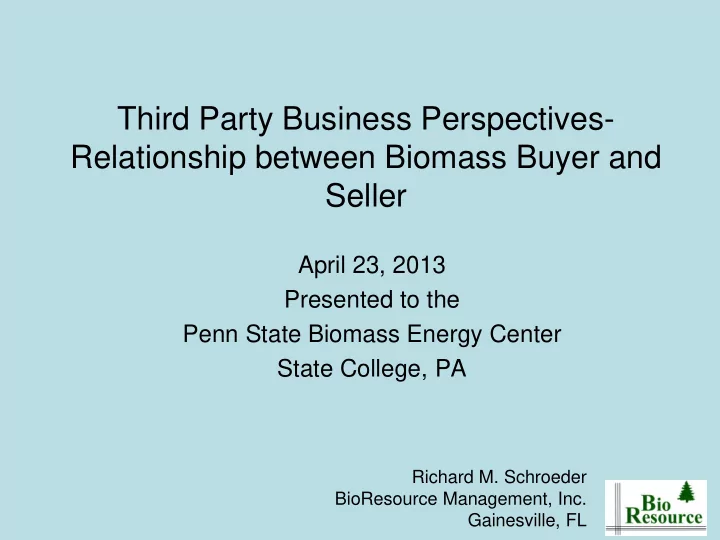

Third Party Business Perspectives- Relationship between Biomass Buyer and Seller April 23, 2013 Presented to the Penn State Biomass Energy Center State College, PA Richard M. Schroeder BioResource Management, Inc. Gainesville, FL
Our company-- BioResource Management, Inc. (BRM) • Based in Gainesville, Florida • Specializes in procurement of biomass for energy. • Over thirty years’ experience • Staff includes certified foresters and environmental scientists.
BRM has helped developed, started up and supplied biomass for many facilities since 1982 • 7.5 MW biomass plant, • 17.8 MW biomass power FL. plant in MA, delivery of • 25,000 tons per year-to 180,000 tons per year. FL state prison. • 18.0 MW biomass power • 40MW biomass plant in plant in NY, delivery of FL, delivery of 150,000 160,000 tons per year. tons annually. • Developing dedicated • 74.9 MW biomass power energy in LA, FL, TX. plant in Florida, delivery of 350,000 tons per year. • .
In June 2011 BRM was awarded long-term contract to manage all biomass for the 100 MW biomass power facility in Gainesville, FL. Project cost $500 million and will receive 1 million tons per year.
Overview of Discussion • Perspectives of the Biomass Buyer • Perspectives of the Biomass Seller • Intersection of Parties’ Interests • Where Things Often Go Wrong • Other Considerations in Contracting
The Biomass Buyer • Generally the project owner or its agent • Often has specific technology that requires specific feedstock Uses one or more biomass types: Dedicated Crops Forestry related material Mill residues Urban Wood Waste Agricultural Residues
Buyer’s Perspectives in Biomass Contracting 1. Lowest cost material meeting specification in sufficient volume ; 2. Dependable, predictable biomass supply; and 3. Supply that is financeable and sustainable. The Buyer needs to demonstrate they have the ‘right’ feedstock to outside parties- engineers, bankers, investors, regulators, and “other interested parties”.
The Biomass Seller • Seller can be a- • Landowner • Generator • Processor/Harvester • Transport Company • Aggregator/Dealer or a combination of all of the above.
The Seller’s Perspectives- • Can I make money producing biomass? • What happens if the Buyer doesn’t take it? • Is this the best opportunity to make money and/or use the assets (land, equipment, resources) that I have?
The Major Intersections of the Two Parties • Costs and Pricing • Reliability to produce and receive • Ability to meet specification Not coincidentally, these are also the most common things to go wrong.
Biomass Costs- three main items: PRODUCTION AND PROCUREMENT PROCESSING DELIVERY
PRODUCTION AND PROCUREMENT Payment to the landowner, grower, or recipient of biomass materials- GAINING TITLE
PROCESSING- Includes harvesting, collecting and sizing to meet Buyer’s specifications
Delivery • All costs associated with loading, transport to Buyer’s location, and in some cases off- loading material meeting specification.
So what can possibly go wrong? • Bad Assumptions • Incorrect Information • Letting Hope Substitute for Judgment
The top list of “things that go wrong”, from thirty years’ experience: • Biomass Specifications • Under-estimating costs • Interruptions of deliveries or receiving
Biomass Specifications • Three primary specifications: –Chemistry- what is the stuff –Particle Size- requirements for the technology –Moisture Content
CHEMISTRY • Nature of biomass. Related to – Species – Plant age – Portion of plant (crown, bole, stump, etc) – Growing micro-environment (soil, water, etc). In general, once committed, neither Buyer or Seller can significantly manage or change chemical content of contracted feedstock. Analyze carefully!
Particle Size- requirement is often not understood by either the Buyer or the Seller. “I told you to bring “I told you I was me this!” bringing you this”!
Particle Size requirement is one of the Key Parameters of Processing Cost then this size could cost If this size costs X to size 2X or 3X to size reduce. reduce…
What do you mean not acceptable-just a couple of oversize pieces!
Cost Assumptions- “Hauling biomass is just like hauling anything else”. Volume required to haul same weight of biomass
Moisture Content- a bigger issue than Seller and Buyer realize • As-received weight (green tons) doesn’t capture potential benefits for efficiency. • Combustion facilities want to buy BTUs, biofuels facilities want to buy usable carbohydrates. • Purchasing by the dry ton helps to capture actual value of the feedstock.
Moisture Content has large impact for Buyer BTU/Lb. Dry Pine 8,500 Water (1,200) Reducing the Moisture Btu Btu Net BTU moisture Content Wood Water Value content from 50% 4,250 (600) 3,650 50% to 32% 47% 4,505 (564) 3,941 is a weight 44% 4,760 (528) 4,232 loss of 18%, 41% 5,015 (492) 4,523 but an 38% 5,270 (456) 4,814 increase in BTU value of 35% 5,525 (420) 5,105 40% 32% 5,780 (384) 5,396
The Seller can also capture more value per truckload. Transport Using a selling Moisture Dry Tons Value per Cost/Dry price of $40.00 Content per Load Load Ton per dry ton, $.14 50% 14.00 $560.00 $16.80 per mile haul cost 45% 15.40 $616.00 $15.27 for a 60 mile 40% 16.80 $672.00 $14.00 haul, and a 28 35% 18.20 $728.00 $12.92 ton load, a seller 33% 18.76 $750.40 $12.54 can gain a value 31% 19.32 $772.80 $12.17 of $168.00 per 29% 19.88 $795.20 $11.83 load by delivering 27% 20.44 $817.60 $11.51 at 35% MC 25% 21.00 $840.00 $11.20 instead of 50%.
Other Biomass Contracting Elements • The Buyer- Buy at the lowest price, but there is no benefit from having an economically weak supplier • Seller- don’t over-commit on price and specifications. Plan to be forced to supply. • Buyer- longest fixed term the better. Seller- need a long enough term to pay off investment.
QUESTIONS OR COMMENTS? BioResource Management, Inc. 4249 NW 56 th Way Gainesville, FL 32606 352-377-8282 rs@bio-resource.com
Recommend
More recommend